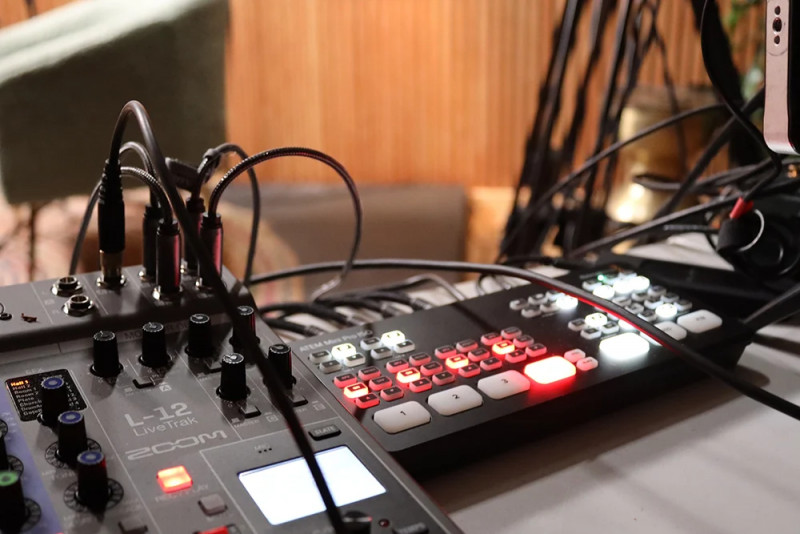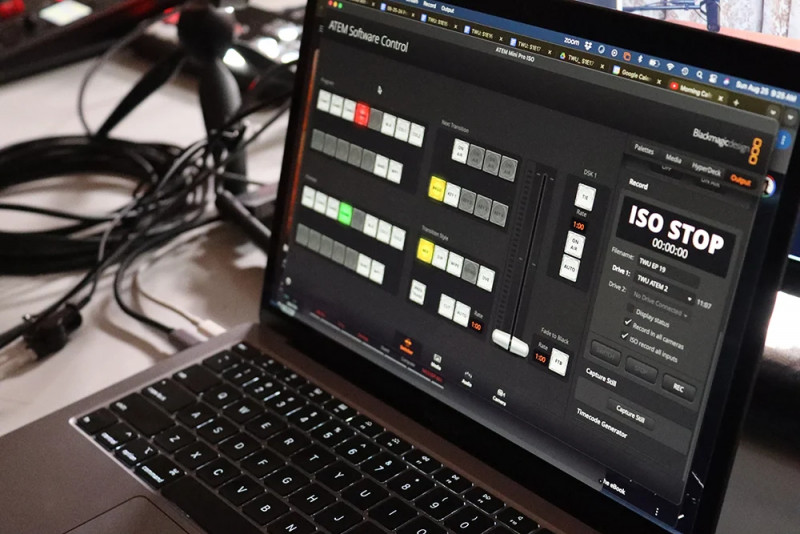That Was Us Podcast Recorded with Blackmagic Design Cameras and ATEM Mini Pro ISO
Blackmagic Design workflow streamlines production process for “This Is Us” rewatch podcast.
Blackmagic Design today announced “That Was Us,” a rewatch podcast for the hit show “This Is Us,” uses Blackmagic Pocket Cinema Camera 4K digital film cameras and an ATEM Mini Pro ISO live production switcher to produce weekly episodes airing on the podcast’s YouTube channel.
Hosted by “This Is Us” stars Mandy Moore, Sterling K. Brown and Chris Sullivan, “That Was Us” relives each episode of the show while the hosts share behind the scenes stories and experiences from the show’s production. Filmed in a small comedy theater in Santa Monica, CA, the podcast is produced by LA based Rabbit Grin Productions, which has also produced numerous celebrity podcasts including “Armchair Expert,” “Family Trips with the Meyers Brothers,” “Unqualified,” and more.

According to Rabbit Grin Productions’ Co founder and Producer Jeph Porter, “We’ve built a few studios using Blackmagic products, and we really liked the integration they provide and how they streamline the production process. At first, we shot on standalone cameras, and we ran into issues with corrupt files and loss of footage. That’s when we brought the ATEM Mini Pro ISO into the mix to act as a backup system for our cameras. On our next studio build, we added the Pocket Cinema Camera 4Ks so we could control them from the ATEM. By the time we built the studio for ‘That Was Us,’ we were fully committed to using Blackmagic products.”
Depending on the number of guests for each recording, the studio for “That Was Us” features four to five Pocket Cinema Camera 4Ks, all connected via HDMI to the ATEM Mini Pro ISO. Because the studio is in a functioning theater, a Rabbit Grin Productions engineer and producer are onsite to set up each individual recording.

“I find the cameras incredibly easy to use and set up,” said Porter. “The interface is simple and effective, and the cameras’ large screens make them very nice and straightforward, especially in a studio environment. The ATEM is a revolution to me. I know we’re not even using it to its full potential but having the ability to control all my cameras, record backups, use it as a webcam to stream to meetings, and receive an edit of the episode via its ISO functionality is incredible.”
“We have many guests brought in via Zoom, and we use the ATEM as our webcam for the Zoom guest, which allows them to see who is speaking to them onscreen,” added Porter. “Sometimes we do shows on Zoom, and I’ve been using the ATEM to route the computer display through it and record the Zoom feed. This gives me a higher quality Zoom recording and in a format I don’t need to convert to work with. It just makes the overall workflow great. When recording the show with a Zoom guest, it is live switched by the engineer. Otherwise, we don’t live switch and save it all for post.”

Episodes are recorded in Blackmagic RAW from the cameras onto SSDs, as well as to USB disks via the ATEM Mini Pro ISO for backup, with the grade completed using DaVinci Resolve Studio editing, color grading, visual effects (VFX) and audio post production software.
With the success of its Blackmagic Design workflow, Rabbit Grin Productions has also built out its own studio for several other podcast clients. “We created a pretty identical setup, except we upgraded to the ATEM Mini Extreme ISO which allows us to utilize more cameras, more inputs, and output more options,” said Porter. “With that, we can control the cameras, present info on a connected TV screen, and use it as a webcam via the additional USB-C port that goes to Zoom for our guests to see and for remote producers to monitor. What I love about the gear is the integration of the system which really eases our workflow. On top of that, the quality of the images we get is incredible.”

He concluded, “Rabbit Grin Productions prides itself on going above and beyond when it comes to the quality of the shows we produce. With the Blackmagic gear we can do that and keep everything organized and efficient. And because we’re putting out weekly content that has an hour or more running time with each episode, having a high quality, efficient system is invaluable.”